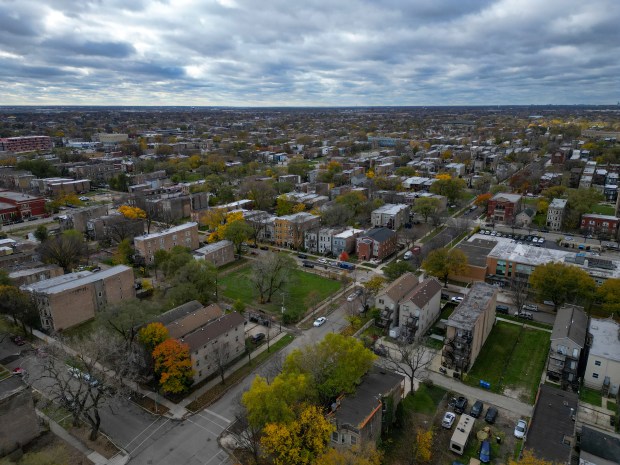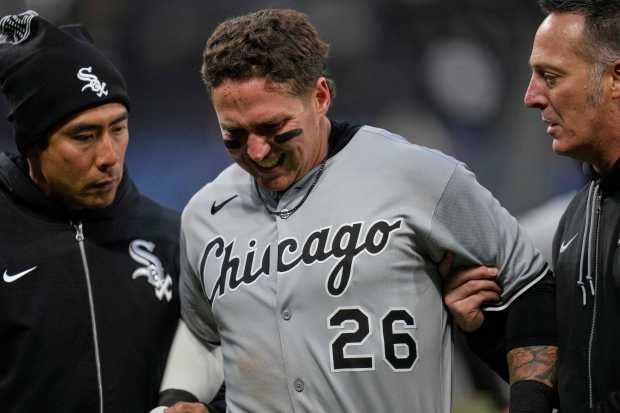Ali Ahamad has several ideas for how to turn North Lawndale’s vacant lots from eyesores into neighborhood attractions. He hopes to construct the neighborhood’s first dog park, a playground and a garden next to his property and new homes for community members.
He has seen a flurry of development in the neighborhood over the last few years and is waiting to see what the city’s new for-sale housing development program starting early next year brings.
The homeowner and landlord, who grew up in North Lawndale and now raises his two kids there, said he wants to participate in the program but will have to remain on the sidelines given the requirements for, and lack of notice about, the initiative, and because his desired city-owned lots are not being offered.
“The development should come,” Ahamad said, who lives on a block with at least five vacant lots, only one of which is available for purchase as a part of the new program. “But at least give the people that (are) stakeholders and people that have been here … the opportunity.”
The West Side’s North Lawndale community is on the verge of receiving city investment. The program — called the Missing Middle Infill Housing Initiative — will begin as a pilot in North Lawndale and is part of the Chicago Department of Planning and Development’s $75 million initiative to build “missing middle housing” in neighborhoods on the South and West sides. Forty-four of North Lawndale’s few thousand vacant lots will soon be turned over to developers in an effort by the city to provide lower-cost, owner-occupied, for-sale housing options and repopulate communities after a decadeslong population decline.
Many residents and real estate professionals working and living in North Lawndale like Ahamad said they’re excited about the investment. They also are concerned that the city did not provide enough notice to the community about the program and worry that developers who receive the lots might be large companies that are unfamiliar with the neighborhood and not as invested in it compared with smaller Black developers and residents.
Ald. Monique Scott, whose 24th Ward includes North Lawndale, said this program is for larger, more established developers, but there will be opportunities for smaller developers to buy lots from the city in the spring. She said that does not mean the program is not for Black developers, but that the program is for developers who are ready to put shovels in the ground in a community that has not seen investment in more than 60 years.
“We live in a central place that is waiting for developers to come and dig us out of a hole,” Scott said.
Melvin Bailey, who is from North Lawndale and still lives there, is a Black developer who hopes to build 10 to 20 single-family homes through the city’s missing middle housing program if the city accepts his application. He also helped other residents and smaller developers with their applications and thinks Mayor Brandon Johnson’s administration did a better job compared with previous administrations in giving applicants time to apply for the development opportunity.
Bailey, owner of the rehab company Community Male Empowerment Project and the new construction company Citizens Building a Better Community, is looking forward to the new program and what it can bring to North Lawndale. He said he hopes to sell homes through the program for about $350,000, so they are affordable for the community and plans to hire neighborhood residents for the construction jobs.
“I hope it’s a springboard to bring more development and more focus to Lawndale,” Bailey said. “And if local developers get more opportunities to develop, they’ll get more chances” for future projects.
One local whom Bailey helped is general contractor McClain Sanders, owner of Roszie Gold Enterprise. Sanders’ company focuses on renovation work in North Lawndale but is learning the ropes of development under Bailey’s mentorship, according to Sanders.
Sanders applied to this development initiative, but said the city is “always moving the goalpost on the little guys” by not giving smaller companies enough time to thoughtfully apply to city programs.
Sanders, who said his family has lived in North Lawndale for over 100 years, said there is not enough development work for Black contractors like him in the area, but he wants to bring North Lawndale “back up to where it is supposed to be” without displacing anyone. And, he said, receiving the subsidies and lots through the city’s program would make a big difference for his company.
“It would set a trend for my company. It would show … that Black contractors are capable of putting up nice homes for single families and low-income families,” Sanders said. “It opens the doors for a lot of other adventures.”
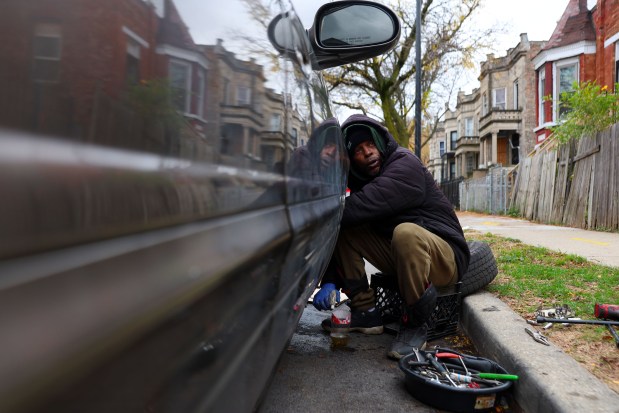
Applicants could apply to purchase a minimum of five lots, being sold for $1 each, through Nov. 15 and can receive up to $150,000 per unit to further subsidize construction costs. The lots have assessed values ranging from about $4,000 to nearly $50,000. Construction costs have skyrocketed since the COVID-19 pandemic due to supply chain issues and elevated labor costs, making it more difficult for developers to sell new construction homes at more affordable price points.
The median household income in North Lawndale is just above $30,000, according to the city’s program guide. The national median sales price for new single-family residential homes sold in September was $426,300, according to the most recent data from the U.S. Census Bureau and the U.S. Department of Housing and Urban Development.
City allocates $75 million in bond funds to market rate housing initiative on South and West sides
Alonzo Abron is another general contractor who works in North Lawndale and was in the process of “scrambling” with his business partners at All Hab Developments to apply when he spoke with the Tribune in early November, but ended up not applying to the program because “we didn’t feel that we had everything we needed to go ahead and get it approved.”
Abron said he plans to apply for single lots in the spring.
Dawveed Scully, managing deputy commissioner with the city’s planning department, said the city tried to get the word out about the program, emphasizing that the initiative is a pilot and a range of opportunities with vacant city land have been and will be available for residents with ranges of real estate experience. The city hosted two Zoom informational sessions on the development program in October with more than 800 people in attendance, Scully said, and posted the presentation online.
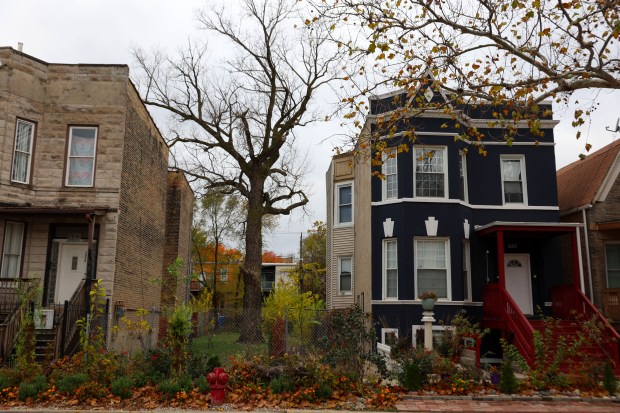
Scully said the department received 30 unique applicants and will be considering a multitude of factors when selecting awardees, including considering if they are “emerging developers” and if their designs fit into the “neighborhood context.” Awardees will likely be announced in January, he said, with community events for residents to meet the developers and hear about the planned designs.
“One of the really great things about Missing Middle and why we are putting funding behind it is because it is really intended to enable those developments to happen in the communities that need it the most, where we have the most (city-owned) land,” Scully said. “But also keep it at enough of a price point that folks in the neighborhood can participate, can engage.”
Johnson’s ambitious $1.25B bond plan, $70M migrant proposal pass City Council
Martiez Grayer and his business partner, Wesley Hooker, attended one of the city’s Zoom sessions. They were eager to apply to the program until they learned that applicants needed to take on multiple vacant lots. They own a small general contracting company, Rufarro Remodeling & Maintenance, and said they did not have enough time to get an application together and are typically not able to manage that many properties at once.
Grayer said he did not know the city program is aimed toward larger developers or that there will be single lots available in the spring.
Grayer, who is from North Lawndale and has family who still lives there, said he wishes the city had gotten input from community members like him who pride themselves on involvement in the neighborhood. His company has completed six residential properties in the neighborhood, providing homeownership and rental opportunities.
Other residents who are not directly involved in North Lawndale real estate development are also concerned about the future of the neighborhood.
Apriel Campbell is a resident and homeowner who works for the North Lawndale Community Coordinating Council. Denita Robinson is a homeowner and small landlord in the neighborhood who works for Neighborhood Housing Services of Chicago. Both longtime North Lawndale residents expressed their hope that the city include local Black contractors in the program and receive feedback from residents on their desires for the neighborhood before the development takes place. They worry about gentrification.
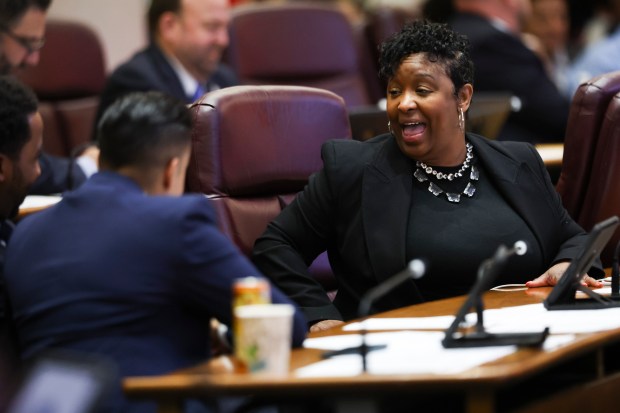
“People are afraid more so than they are optimistic,” Robinson said. “(It’s) not that they don’t want better change, but people have to also understand, historically, better change has never been to benefit Black and brown communities.”
Scott said North Lawndale “deserves better” and that residents will not be “kicked out.”
“We have conditioned ourselves to live in a poor state of mind,” Scott said. “Nobody should see trash all over the place and vacant buildings, and (this program) doesn’t mean gentrification; it means we are reimagining a community that has been totally dissolved in devastation.”


